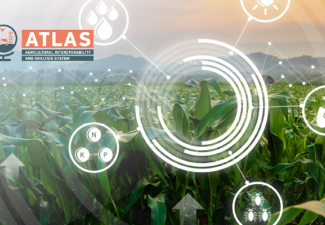Interoperability and Analysis System for Innovative, Data-driven Agriculture

The continuous evolution of the agricultural sector includes the incorporation and adaptation of the latest technologies. The Horizon 2020 project Agricultural Interoperability and Analysis System (ATLAS) is working to promote interoperability among agricultural machinery, sensor systems, robotic applications, and data analysis tools to increase farmers' productivity and profitability in sustainable ways. Companies can submit innovative solutions until 1 September 2021 and obtain EU funding to implement them within the ATLAS network.
Today’s modern agriculture is becoming more and more data-driven. Meanwhile, the adaption of sensor technology, data acquisition services, and advanced data processing and analysis capabilities is critical to achieving increased sustainability and productivity in agricultural operations. An open, flexible, and distributed service network of applications is needed to facilitate the digital transformation in agriculture, unify datasets, and generate new services based on the sector’s needs.
The goal of ATLAS is to develop an open interoperability network for agricultural applications and build up a sustainable ecosystem for innovative data-driven agriculture. By promoting flexible combinations of agricultural machinery, sensor systems, and data analysis tools, ATLAS will overcome the current lack of interoperability and enable farmers to use the most advanced digital technology on their own. ATLAS, a joint research project funded by the Horizon 2020 Research and Innovation programme, is bringing together a consortium of 30 agricultural stakeholders and researchers from seven European countries.
The consortium is now looking for innovative solutions via the 2nd open call for development of new services in alignment with agricultural use cases at the consortium’s farming operations. Until 23:59 CEST on 1 September 2021, interested companies will be able to submit their proposals here.
“Modern agriculture is facing a multitude of environmental, economic, and societal challenges. The public’s awareness of environmental impacts is increasing, and there is a demand for sustainably produced food. The next generation of farmers needs to face these challenges, and digital transformation is the key technology that will help them do so,” says Dr Stefan Rilling, ATLAS coordinator at the Fraunhofer Institute for Intelligent Analysis and Information Systems (IAIS).
Innovative companies will receive seed funding for the services they provide through the ATLAS interoperability network. Proposed solutions should offer clear added value to customers or stakeholders along the agricultural value chain and focus on the integration of services that build on and extend the use cases carried out within the project. Interested companies legally established and based in one of the EU Member States or one of the countries associates with H2020 are welcome to participate.
In 2020, the ATLAS consortium received 89 proposals for its first open call and chose six winners to receive EUR 305,000 to implement their services within the ATLAS network. This year, the consortium will fund up to 14 business entities by allocating an average of EUR 52,500 per use case. In addition, successful participants will become part of the ATLAS ecosystem and benefit from its extensive network of end-users, service providers, researchers, and policymakers. All the companies funded will present their solutions in front of all the project’s stakeholders and interested third parties at a Demo Day event to be held at one of the project’s five Innovation Hubs.
ATLAS will run for 42 months with 30 partners from seven European countries: Germany, Switzerland, Greece, Italy, Romania, Spain, and Latvia. The ATLAS consortium’s test sites include 13 agricultural operations at different geographical locations in Europe, with a variety of farm sizes and farming goods produced. Of these, five are purely research farms, six are commercial farms, and two are combined research/commercial farms. The pilot studies will be carried out at five Innovation Hubs at the test sites in close collaboration with end users. ATLAS is bringing together an excellent combination of stakeholders that have been active in the automation, IoT, and robotics sectors since before the term “smart farming” was even coined. The Fraunhofer Institute for Intelligent Analysis and Information Systems (IAIS, Germany) is coordinating the project.